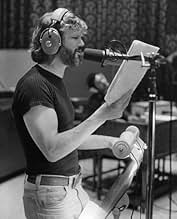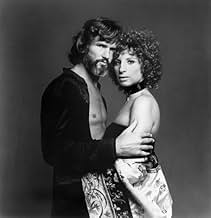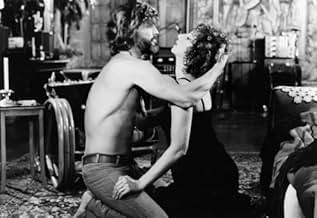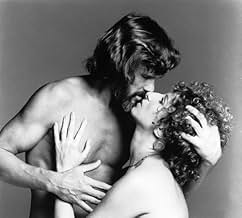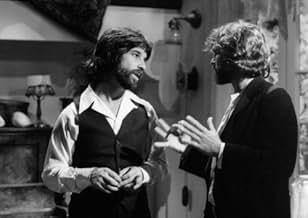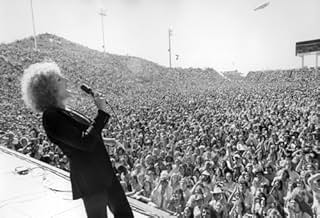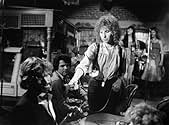CALIFICACIÓN DE IMDb
6.1/10
14 k
TU CALIFICACIÓN
Una vieja gloria del rock se enamora de una cantante joven y prometedora.Una vieja gloria del rock se enamora de una cantante joven y prometedora.Una vieja gloria del rock se enamora de una cantante joven y prometedora.
- Dirección
- Guionistas
- Elenco
- Ganó 1 premio Óscar
- 7 premios ganados y 7 nominaciones en total
Sammy Lee Creason
- The Speedway
- (as Sam Creason)
Opiniones destacadas
I was fully expecting to dislike this version of A Star Is Born, since I'd already seen the 1954 version and loved it. I'd also already seen the 1937 original, and while it wasn't as good as the remake, I still appreciated it. My mom said she couldn't stand the 1976 version, and we usually have pretty similar taste, especially when it comes to musicals. Surprise, surprise, I loved it.
The reason I was able to enjoy A Star Is Born so much is because I pretended it was a completely different movie. If you've seen either of the two earlier versions and expect a traditional remake, you'll probably hate it. John Gregory Dunne, Joan Didion, and Frank Pierson may have based their concept on a previous story, but they've written a completely different script. So, for the purpose of telling you my thoughts on the film, I won't compare it at all to the Judy Garland version.
Kris Kristofferson might be the only person in the world who can pull off a bearded, '70s look while still coming across as hygienic. It doesn't make sense that I think he's wildly attractive, since I usually hate that look, but I was in heaven with the amount of eye candy in this movie. Perfectly cast as a popular rock star, he starts the movie past his peak. He drinks, snorts cocaine, forgets his lyrics onstage, and performs outrageous, life-threatening stunts. He chances upon Barbra Streisand singing in a nightclub and is so impressed with her talent, he propels her to stardom. And of course, they fall in love.
I really am surprised by how much I liked this movie, since so much of it isn't usually my cup of tea. The 1970s isn't my favorite decade, and I usually find the clothes and hairstyles irritating. With exception to two of the plentiful songs in the movie, I didn't really like the music. Barbra Streisand's character has plenty of bite to her, which I don't usually find sympathetic. Somehow, putting all the elements together worked beautifully. Somehow, it made total sense that Barbra gave Kris attitude when they were first getting to know each other. I won't be buying the soundtrack, but Barbra's vocal talent was extremely impressive; it was very understandable that audiences in the film were wowed by her.
Both leads put their whole hearts into their performances, and even though this was the third time I'd seen the story, I still cried during each of their "big scenes". If you know the story, you know which ones they are. I'd always thought of Kris as just a good-looking singer, but I was surprised by how much dramatics he poured into his scenes. Barbra is always a good performer, and in her romantic one-on-one scenes, she's tender and vulnerable. She's been paired up with a very long list of good-looking leading men-Robert Redford, Ryan O'Neal, Jeff Bridges, Omar Sharif, Nick Nolte, and young Mandy Patinkin-and I've never seen her with greater, sweeter, lovelier chemistry than with Kris Kristofferson. The way they look at each other is so beautiful, like how Jack Carson looked at Doris Day in Romance on the High Seas. If you like the Oscar-winning song "Evergreen", you'll love the scene in the movie when they sing it together.
My advice is to either watch this version first or forget you've seen any other version when you rent it. He's gorgeous, she's in her perm-prime, and if you like '70s rock, you'll really love it.
The reason I was able to enjoy A Star Is Born so much is because I pretended it was a completely different movie. If you've seen either of the two earlier versions and expect a traditional remake, you'll probably hate it. John Gregory Dunne, Joan Didion, and Frank Pierson may have based their concept on a previous story, but they've written a completely different script. So, for the purpose of telling you my thoughts on the film, I won't compare it at all to the Judy Garland version.
Kris Kristofferson might be the only person in the world who can pull off a bearded, '70s look while still coming across as hygienic. It doesn't make sense that I think he's wildly attractive, since I usually hate that look, but I was in heaven with the amount of eye candy in this movie. Perfectly cast as a popular rock star, he starts the movie past his peak. He drinks, snorts cocaine, forgets his lyrics onstage, and performs outrageous, life-threatening stunts. He chances upon Barbra Streisand singing in a nightclub and is so impressed with her talent, he propels her to stardom. And of course, they fall in love.
I really am surprised by how much I liked this movie, since so much of it isn't usually my cup of tea. The 1970s isn't my favorite decade, and I usually find the clothes and hairstyles irritating. With exception to two of the plentiful songs in the movie, I didn't really like the music. Barbra Streisand's character has plenty of bite to her, which I don't usually find sympathetic. Somehow, putting all the elements together worked beautifully. Somehow, it made total sense that Barbra gave Kris attitude when they were first getting to know each other. I won't be buying the soundtrack, but Barbra's vocal talent was extremely impressive; it was very understandable that audiences in the film were wowed by her.
Both leads put their whole hearts into their performances, and even though this was the third time I'd seen the story, I still cried during each of their "big scenes". If you know the story, you know which ones they are. I'd always thought of Kris as just a good-looking singer, but I was surprised by how much dramatics he poured into his scenes. Barbra is always a good performer, and in her romantic one-on-one scenes, she's tender and vulnerable. She's been paired up with a very long list of good-looking leading men-Robert Redford, Ryan O'Neal, Jeff Bridges, Omar Sharif, Nick Nolte, and young Mandy Patinkin-and I've never seen her with greater, sweeter, lovelier chemistry than with Kris Kristofferson. The way they look at each other is so beautiful, like how Jack Carson looked at Doris Day in Romance on the High Seas. If you like the Oscar-winning song "Evergreen", you'll love the scene in the movie when they sing it together.
My advice is to either watch this version first or forget you've seen any other version when you rent it. He's gorgeous, she's in her perm-prime, and if you like '70s rock, you'll really love it.
The anticipation for this musical film was huge. It seemed the perfect star vehicle for Barbra Streisand and she hadn't had a hit for almost three years ("The Way We Were"). Janet Gaynor and Judy Garland were superlative in their creations of the classic tale of the Hollywood couple -- one star on the rise, the other on the skids. Could Streisand put her own indelible mark on this material as well and reestablish herself as a triple-threat performer?
Nope. Not even close. This third version (actually fourth, if you include 1932's "What Price Hollywood" starring Constance Bennett and Lowell Sherman) stalls early in the game by transposing the dramatic setting of Hollywood movie-making to the brash, uncouth pop/rock music scene... and it is only one of many fundamental mistakes this movie makes.
The rags-to-riches story of Esther Hoffman Howard ain't believable for one second. Streisand the struggling artist? She plays Barbra the hard-assed star from the very first scene, lacking the courage or ability to immerse herself into a fully-realized character. She brays and bullies from the onset, showing no emotional colors whatsoever in a performance bereft of weakness, vulnerability and, as a result, sympathy. Ironically, she played this part to perfection ten years before -- as Fanny Brice, the gawky chorus girl who became a Ziegfeld Follies legend. Well, somewhere in those ten years, is a big star who has forgotten how to laugh at herself.
Its been said that Elvis Presley was briefly considered for the part of John Norman Howard, the singer on the skids, but turned it down for fear of being upstage by Streisand. All the same, one wonders what "The King" might have done with a too-close-to-reality role like this. In the hands of Kris Kristofferson, he tosses in a performance so lackadaisical and careless that one wonders if he was sober at all during the film's shoot. They appear to be performing in two different movies. Neither one interesting.
The screenplay is hopeless trite and corny, fueling some of the most unintentionally funny scenes in recent memory. Streisand's fight scene with Kristofferson after she catches him in the sack with some chippy and her emotional cassette-ripping scene in the mansion after John Howard's death are just plain embarrassing. If she's such a perfectionist in real life, how did these two scenes ever get by the editor's scissors.
The one thing Streisand did right in this movie is the one thing she can never do wrong. Sing. Possessing arguably the finest vocal instrument known to man, she weaves absolute magic in her singing scenes, notably "Woman in the Moon" and especially her heart-breaking finale number, "Are You Watching Me Now." Here, and only here, does she seize an emotional connection to Esther that evaded her throughout the film.
Alas, it is not enough to save this film dud. But, if you must see this, I'd advise you to skip the acting scenes and fast-forward to each Streisand number. Better yet, buy the CD.
Nope. Not even close. This third version (actually fourth, if you include 1932's "What Price Hollywood" starring Constance Bennett and Lowell Sherman) stalls early in the game by transposing the dramatic setting of Hollywood movie-making to the brash, uncouth pop/rock music scene... and it is only one of many fundamental mistakes this movie makes.
The rags-to-riches story of Esther Hoffman Howard ain't believable for one second. Streisand the struggling artist? She plays Barbra the hard-assed star from the very first scene, lacking the courage or ability to immerse herself into a fully-realized character. She brays and bullies from the onset, showing no emotional colors whatsoever in a performance bereft of weakness, vulnerability and, as a result, sympathy. Ironically, she played this part to perfection ten years before -- as Fanny Brice, the gawky chorus girl who became a Ziegfeld Follies legend. Well, somewhere in those ten years, is a big star who has forgotten how to laugh at herself.
Its been said that Elvis Presley was briefly considered for the part of John Norman Howard, the singer on the skids, but turned it down for fear of being upstage by Streisand. All the same, one wonders what "The King" might have done with a too-close-to-reality role like this. In the hands of Kris Kristofferson, he tosses in a performance so lackadaisical and careless that one wonders if he was sober at all during the film's shoot. They appear to be performing in two different movies. Neither one interesting.
The screenplay is hopeless trite and corny, fueling some of the most unintentionally funny scenes in recent memory. Streisand's fight scene with Kristofferson after she catches him in the sack with some chippy and her emotional cassette-ripping scene in the mansion after John Howard's death are just plain embarrassing. If she's such a perfectionist in real life, how did these two scenes ever get by the editor's scissors.
The one thing Streisand did right in this movie is the one thing she can never do wrong. Sing. Possessing arguably the finest vocal instrument known to man, she weaves absolute magic in her singing scenes, notably "Woman in the Moon" and especially her heart-breaking finale number, "Are You Watching Me Now." Here, and only here, does she seize an emotional connection to Esther that evaded her throughout the film.
Alas, it is not enough to save this film dud. But, if you must see this, I'd advise you to skip the acting scenes and fast-forward to each Streisand number. Better yet, buy the CD.
It's always been many people's dreams to become famous. Who could resist having tons of fans, lots of money and being able to do anything you want? It's a big change for anyone who makes this transition and most of the time, they end up cracking under pressure. Once this happens, frequently, the newly discovered celebrity will turn to drugs and other means to escape reality to find peace among themselves. But how often does someone discover the right person that'll keep him or her from going down the wrong path while in this state of glory? Now a days, it happens often enough that nobody thinks about it. Back then though, probably was a different story.
Audiences will be introduced to artist John Norman Howard (Kris Kristofferson), an entertainer who's stardom is beginning to die among his fans. He takes drugs, drinks constantly, and sings the same hits every time he's on tour. Until one night, he goes out on the town, decides to sit at a local bar and discover someone who can sing just as good if not better than him. That singer is Esther Hoffman (Barbra Streisand), a girl just trying to make a living, seeking love and hoping to make it big in show biz. It's John who's going to help her get there. Thus allowing Esther to as John puts it - "Getting small piece of the American Dream". Ergo the title of the movie.
The movie is directed by Frank Pierson who also wrote for Cool Hand Luke (1967) and Dog Day Afternoon (1975). Pierson also wrote the screenplay with two other writers who formed a fairly solid story. The only weak point is the unclear characterization Kristofferson's character. There are some motivations of John Norman Howard that aren't exactly explained. He'll do actions that should require explanations to but doesn't give one. It's understood that he's a wild and free man but every action has a motive behind it. They don't just go unexplained. Other than that, Kristofferson's performance is well acted. It's even more coincidental that a lot of the scenes displayed throughout the running time depict rather closely to what Kristofferson himself was going through at the time of his life.
Barbra Streisand also puts in a good performance as the unknowing upcoming celebrity that is forced into the life of popularity and paparazzi. Of course, when Streisand and Kristofferson are together, their chemistry feels natural. This is also displayed when these actual artists perform together as well. Audiences should appreciate that Streisand had the singing scenes filmed without voice-over work. It makes the performances and singing that much more believable and emotional. There's also a few other actors who pop in from time to time. Tony Orlando and Kristofferson's future spouse Rita Coolidge have a scene together. A very young and what appears to be sane Gary Busey plays John Norman Howard's head collaborator. Even Robert Englund from A Nightmare on Elm Street (1984) has a brief scene.
Although the films running time is about as long as your normal Michael Bay summer blockbuster (which may bore some viewers), these last few pieces help make the film as entertaining as it can be. Assisting to condense the movie as much as it could and make scenes flow was editor Peter Zinner who also edited for The Godfather (1972). Then there's Roger Kellaway's score to the film, which does try to keep the emotions high. However, it's not always present because half of the emotion is shown in the singing done by the main leads, which should satisfy most score aficionados. Lastly is Robert Surtees' cinematography where he captures very large concert audience shoots and some very beautiful rural landscape. It's an entertaining human drama with some flaws.
It lacks a little characterization and might be long for some, but the actors portray raw emotion and real performances to boot. The story is also a good representation of how quickly popularity can fall or soar.
Audiences will be introduced to artist John Norman Howard (Kris Kristofferson), an entertainer who's stardom is beginning to die among his fans. He takes drugs, drinks constantly, and sings the same hits every time he's on tour. Until one night, he goes out on the town, decides to sit at a local bar and discover someone who can sing just as good if not better than him. That singer is Esther Hoffman (Barbra Streisand), a girl just trying to make a living, seeking love and hoping to make it big in show biz. It's John who's going to help her get there. Thus allowing Esther to as John puts it - "Getting small piece of the American Dream". Ergo the title of the movie.
The movie is directed by Frank Pierson who also wrote for Cool Hand Luke (1967) and Dog Day Afternoon (1975). Pierson also wrote the screenplay with two other writers who formed a fairly solid story. The only weak point is the unclear characterization Kristofferson's character. There are some motivations of John Norman Howard that aren't exactly explained. He'll do actions that should require explanations to but doesn't give one. It's understood that he's a wild and free man but every action has a motive behind it. They don't just go unexplained. Other than that, Kristofferson's performance is well acted. It's even more coincidental that a lot of the scenes displayed throughout the running time depict rather closely to what Kristofferson himself was going through at the time of his life.
Barbra Streisand also puts in a good performance as the unknowing upcoming celebrity that is forced into the life of popularity and paparazzi. Of course, when Streisand and Kristofferson are together, their chemistry feels natural. This is also displayed when these actual artists perform together as well. Audiences should appreciate that Streisand had the singing scenes filmed without voice-over work. It makes the performances and singing that much more believable and emotional. There's also a few other actors who pop in from time to time. Tony Orlando and Kristofferson's future spouse Rita Coolidge have a scene together. A very young and what appears to be sane Gary Busey plays John Norman Howard's head collaborator. Even Robert Englund from A Nightmare on Elm Street (1984) has a brief scene.
Although the films running time is about as long as your normal Michael Bay summer blockbuster (which may bore some viewers), these last few pieces help make the film as entertaining as it can be. Assisting to condense the movie as much as it could and make scenes flow was editor Peter Zinner who also edited for The Godfather (1972). Then there's Roger Kellaway's score to the film, which does try to keep the emotions high. However, it's not always present because half of the emotion is shown in the singing done by the main leads, which should satisfy most score aficionados. Lastly is Robert Surtees' cinematography where he captures very large concert audience shoots and some very beautiful rural landscape. It's an entertaining human drama with some flaws.
It lacks a little characterization and might be long for some, but the actors portray raw emotion and real performances to boot. The story is also a good representation of how quickly popularity can fall or soar.
Thirty years after its initial release, the third version of "A Star Is Born" finally comes to DVD in a package that should please the most devoted fans of Barbra Streisand. That would include me since I just saw her in concert singing among other numbers, the feminist anthem "Woman in the Moon" from this 1976 film. Easy to dismiss, the movie's career-polarizing story is such a sturdy pile of Hollywood-style clichés that variations of it exist in other films including Streisand's own "Funny Girl". This time reset to the then-contemporary music scene, the timeworn plot follows self-destructive rock star John Norman Howard on his deep-dive career descent just as he meets club singer Esther Hoffman who is awaiting her big break.
Troubles dog their courtship from the outset, as John Norman (both names please) responds to grasping fans and bloodless DJs with random acts of violence (from which he inexplicably escapes prosecution). To John Norman, Esther represents his last shot at happiness, and in turn, she is drawn to the innately decent, creative musician underneath the façade. In the movie's most pivotal scene, he gives Esther her big break at a benefit concert, and her career takes off. Inevitably, he can't handle the failure of his career in light of her meteoric success, and if you are familiar with any version of this story, you know the rest. Directed by Frank Pierson (although Streisand's budding directorial talents are obviously on display), the film still manages to draw me in, even though I know it is shamelessly contrived and manipulative. It still has a certain emotional resonance despite its numerous flaws.
Although Streisand in her prime seems like the ideal choice to play a rising singing star, her screen persona is simply too strong and predefined to play Esther credibly. The same can be said for her performing style since the script seems to make allowances for her softer Adult Contemporary-oriented material to be accepted within the otherwise hardened world of arena rock. From the moment she pops her head up as the middle of the Oreos, she can't help but come across as an established star. I can forgive the lapse simply because she is an unparalleled vocal talent, but what becomes less forgiving is how she makes Esther more strident than poignant when John Norman's woes become overwhelming. This creates an oddly discomfiting dynamic in the last part of the film when it becomes less about what caused the climactic event than Esther's response to it. This is capped off by an uninterrupted eight-minute close-up of her memorial performance - great except when she regrettably mimics John Norman's style toward the end.
Kristofferson, on the other hand, gives a superb performance throughout, managing a level of honesty that grounds the film and makes palpable his concurrent feelings of love, pride and resentment toward Esther. He makes his vodka-soaked onstage growling work within this context. Otherwise, what always strikes me as strange about this version is how all the supporting characters are relegated to the background as if they didn't exist unless they were interacting with the two principals. The only ones who register are Paul Mazursky as John Norman's level-headed manager Brian and Gary Busey as his cynical band manager Bobbie. Veteran cameraman Robert Surtees provides a nice burnish to the cinematography though a level of graininess persists in the print. A big seller in its day, the soundtrack is a hodgepodge of different styles from the 1970's - some songs still quite good ("Everything", "Woman in the Moon", "Watch Closely Now"), some that have moved to kitsch ("Queen Bee", Kenny Loggins' "I Believe in Love") and of course, the inescapable "Evergreen".
The print transfer on the 2006 DVD is clean and the sound gratefully crisp thanks to digital remastering. Streisand's participation is the chief lure of the extras beginning with her feature-length commentary. She gives insightful information about the genesis of the film, the casting and the reportedly troubled production. She is also refreshingly candid about the megalomania of Jon Peters, her hairdresser boyfriend who became the movie's producer, and her dissatisfaction with Pierson as a director. I just wish she could have provided more scene-specific comments that directly relate to what is on screen. She also tends to repeat the same anecdotes when the mood strikes her, e.g., it gets tiring to hear for the third time how the person playing the chauffeur was a friend of Peters. I think having a second commentator could have drawn out other nuggets from her.
There is a wardrobe test reel that shows some amusing 1970's clothes, especially Kristofferson's mixed-fabric poncho and orange polyester shirt. There are also twelve deleted scenes included with Streisand's optional commentary. One is a comic bread-baking scene which reminded me how much I like Streisand in farcical comedies. Another is an extended scene in which she plays "Evergreen" on the guitar in front of an awestruck Kristofferson who then falls asleep. The most interesting is an alternate take on the musical finale incorporating fast cuts, which I agree with Streisand should have been used. Fittingly, the theatrical trailers for all three versions of "A Star Is Born" are also included.
Troubles dog their courtship from the outset, as John Norman (both names please) responds to grasping fans and bloodless DJs with random acts of violence (from which he inexplicably escapes prosecution). To John Norman, Esther represents his last shot at happiness, and in turn, she is drawn to the innately decent, creative musician underneath the façade. In the movie's most pivotal scene, he gives Esther her big break at a benefit concert, and her career takes off. Inevitably, he can't handle the failure of his career in light of her meteoric success, and if you are familiar with any version of this story, you know the rest. Directed by Frank Pierson (although Streisand's budding directorial talents are obviously on display), the film still manages to draw me in, even though I know it is shamelessly contrived and manipulative. It still has a certain emotional resonance despite its numerous flaws.
Although Streisand in her prime seems like the ideal choice to play a rising singing star, her screen persona is simply too strong and predefined to play Esther credibly. The same can be said for her performing style since the script seems to make allowances for her softer Adult Contemporary-oriented material to be accepted within the otherwise hardened world of arena rock. From the moment she pops her head up as the middle of the Oreos, she can't help but come across as an established star. I can forgive the lapse simply because she is an unparalleled vocal talent, but what becomes less forgiving is how she makes Esther more strident than poignant when John Norman's woes become overwhelming. This creates an oddly discomfiting dynamic in the last part of the film when it becomes less about what caused the climactic event than Esther's response to it. This is capped off by an uninterrupted eight-minute close-up of her memorial performance - great except when she regrettably mimics John Norman's style toward the end.
Kristofferson, on the other hand, gives a superb performance throughout, managing a level of honesty that grounds the film and makes palpable his concurrent feelings of love, pride and resentment toward Esther. He makes his vodka-soaked onstage growling work within this context. Otherwise, what always strikes me as strange about this version is how all the supporting characters are relegated to the background as if they didn't exist unless they were interacting with the two principals. The only ones who register are Paul Mazursky as John Norman's level-headed manager Brian and Gary Busey as his cynical band manager Bobbie. Veteran cameraman Robert Surtees provides a nice burnish to the cinematography though a level of graininess persists in the print. A big seller in its day, the soundtrack is a hodgepodge of different styles from the 1970's - some songs still quite good ("Everything", "Woman in the Moon", "Watch Closely Now"), some that have moved to kitsch ("Queen Bee", Kenny Loggins' "I Believe in Love") and of course, the inescapable "Evergreen".
The print transfer on the 2006 DVD is clean and the sound gratefully crisp thanks to digital remastering. Streisand's participation is the chief lure of the extras beginning with her feature-length commentary. She gives insightful information about the genesis of the film, the casting and the reportedly troubled production. She is also refreshingly candid about the megalomania of Jon Peters, her hairdresser boyfriend who became the movie's producer, and her dissatisfaction with Pierson as a director. I just wish she could have provided more scene-specific comments that directly relate to what is on screen. She also tends to repeat the same anecdotes when the mood strikes her, e.g., it gets tiring to hear for the third time how the person playing the chauffeur was a friend of Peters. I think having a second commentator could have drawn out other nuggets from her.
There is a wardrobe test reel that shows some amusing 1970's clothes, especially Kristofferson's mixed-fabric poncho and orange polyester shirt. There are also twelve deleted scenes included with Streisand's optional commentary. One is a comic bread-baking scene which reminded me how much I like Streisand in farcical comedies. Another is an extended scene in which she plays "Evergreen" on the guitar in front of an awestruck Kristofferson who then falls asleep. The most interesting is an alternate take on the musical finale incorporating fast cuts, which I agree with Streisand should have been used. Fittingly, the theatrical trailers for all three versions of "A Star Is Born" are also included.
I enjoyed this 70's remake of the marvellous Judy Garland / James Mason classic from the 50's (itself a remake, film snobs) more than I expected without accepting that one isolated minute in it was better than its counterpart in the predecessor. A rocky update of the story is a decent idea and in fact lends itself well to the story-line and if the execution is a bit clunky and now dated, that's both pardonable and understandable.
Things I liked - well let's start with Kris Kristofferson who, with the more difficult part, certainly convinces as a hell-raising rock star, fuelled by drugs and alcohol, aware of tastes and fashions passing him by but with enough perception to see Streisand's Esther as the future. It's fun trying to pick out rock prototypes for his John Norman Howard character - I'm between Jim Morrison and Leon Russell myself, the latter married at the time ironically to sultry singer Rita Coolidge who herself gets a brief cameo appearance, while Howard's behaviour at Streisand's little night club where he "discovers" her recalls an infamous out of control episode in the "lost weekend" period in John Lennon's life, if memory serves. A pity they couldn't have trusted the writer of classics like "Help Me Make It Through The Night" and "Me And Bobby McGee" to contribute some of his own songs to the soundtrack and certainly his signature song here "Watch Closely Now" gets done to death.
I also quite enjoyed the soundtrack. I'm no fan of La Diva Streisand's singing or indeed acting but at least in her vocals she exercises some restraint and delivers a surprising variety of material demonstrating at least some versatility on her part, from the title-theme ballad "Evergreen", (the gorgeous music to which was, surprisingly enough written by her), light Labelle-type funk of "I Believe in Love" and the big torch ballad "The Woman in the Moon" which while beneath Judy's "The Man That Got Away", covers the same territory in a still acceptable way.
Things not to like - Streisand herself does a reasonable job and initially tones down her trademark "kooky" and "sensitive" personae a bit but you never really believe in her as a real person. Unfortunately as the film progresses so does her profile and we get embarrassingly lame scenes with the couple coo-ing at each other in various locations including a candle-surrounded bath scene, Streisand overacting furiously as she argues with a cassette-tape of Howard's voice after he's done his James Dean-type exit from the planet and worst of all that single long shot of her singing the finale medley, which is when you appreciate that yes, it's just another Barbie vanity exercise after all (especially when you see her name down as executive producer).
The dialogue is pretty rock-star cliché throughout and some of the situations come across very second-hand too (Howard snorting up before every show, his assaults on a critical dee-jay, Streisand's MOR music somehow wowing a crowd of rock 'n' rollers at a benefit gig) and of course the familiarity with the story reduces the surprise element of some of the plot developments.
All told though, long as it was, there were far worse films than this made in the 70's. By the way, what a pity they never released the version of "Evergreen" with Kristofferson harmonising on the middle section - it works a treat and adds to an already very pretty melody.
Things I liked - well let's start with Kris Kristofferson who, with the more difficult part, certainly convinces as a hell-raising rock star, fuelled by drugs and alcohol, aware of tastes and fashions passing him by but with enough perception to see Streisand's Esther as the future. It's fun trying to pick out rock prototypes for his John Norman Howard character - I'm between Jim Morrison and Leon Russell myself, the latter married at the time ironically to sultry singer Rita Coolidge who herself gets a brief cameo appearance, while Howard's behaviour at Streisand's little night club where he "discovers" her recalls an infamous out of control episode in the "lost weekend" period in John Lennon's life, if memory serves. A pity they couldn't have trusted the writer of classics like "Help Me Make It Through The Night" and "Me And Bobby McGee" to contribute some of his own songs to the soundtrack and certainly his signature song here "Watch Closely Now" gets done to death.
I also quite enjoyed the soundtrack. I'm no fan of La Diva Streisand's singing or indeed acting but at least in her vocals she exercises some restraint and delivers a surprising variety of material demonstrating at least some versatility on her part, from the title-theme ballad "Evergreen", (the gorgeous music to which was, surprisingly enough written by her), light Labelle-type funk of "I Believe in Love" and the big torch ballad "The Woman in the Moon" which while beneath Judy's "The Man That Got Away", covers the same territory in a still acceptable way.
Things not to like - Streisand herself does a reasonable job and initially tones down her trademark "kooky" and "sensitive" personae a bit but you never really believe in her as a real person. Unfortunately as the film progresses so does her profile and we get embarrassingly lame scenes with the couple coo-ing at each other in various locations including a candle-surrounded bath scene, Streisand overacting furiously as she argues with a cassette-tape of Howard's voice after he's done his James Dean-type exit from the planet and worst of all that single long shot of her singing the finale medley, which is when you appreciate that yes, it's just another Barbie vanity exercise after all (especially when you see her name down as executive producer).
The dialogue is pretty rock-star cliché throughout and some of the situations come across very second-hand too (Howard snorting up before every show, his assaults on a critical dee-jay, Streisand's MOR music somehow wowing a crowd of rock 'n' rollers at a benefit gig) and of course the familiarity with the story reduces the surprise element of some of the plot developments.
All told though, long as it was, there were far worse films than this made in the 70's. By the way, what a pity they never released the version of "Evergreen" with Kristofferson harmonising on the middle section - it works a treat and adds to an already very pretty melody.
¿Sabías que…?
- TriviaKris Kristofferson said, "Filming with Barbra Streisand is an experience which may have cured me of the movies."
- ErroresAfter John Norman crashes his motorcycle, and Esther runs to him, there are dirty hand prints on the back of her blouse before John Norman pulls her down in the dirt and puts his hands on her back.
- Citas
Esther Hoffman: You can trash your life but you're not going to trash mine.
- Créditos curiososMs. Streisand's clothes from ... Her Closet.
- Versiones alternativasStreisand interpolated previously unused footage for the film's 2018 release on Netflix. Original footage restored a guitar version of "Evergreen" previously cut to condense the film. The finale "With One More Look at You/Watch Closely Now" was re-edit from a single take to a more enhanced visual.
- ConexionesEdited into Barbra Streisand: Woman in Love (1981)
Selecciones populares
Inicia sesión para calificar y agrega a la lista de videos para obtener recomendaciones personalizadas
- How long is A Star Is Born?Con tecnología de Alexa
Detalles
- Fecha de lanzamiento
- País de origen
- Idioma
- También se conoce como
- A Star Is Born
- Locaciones de filmación
- Empire Ranch, Sonoita, Arizona, Estados Unidos(newly built honeymoon home)
- Productoras
- Ver más créditos de la compañía en IMDbPro
Taquilla
- Presupuesto
- USD 6,000,000 (estimado)
- Total en EE. UU. y Canadá
- USD 80,000,000
- Total a nivel mundial
- USD 80,000,115
- Tiempo de ejecución2 horas 19 minutos
- Mezcla de sonido
- Relación de aspecto
- 1.85 : 1
Contribuir a esta página
Sugiere una edición o agrega el contenido que falta

Principales brechas de datos
What is the Japanese language plot outline for Nace una estrella (1976)?
Responda




